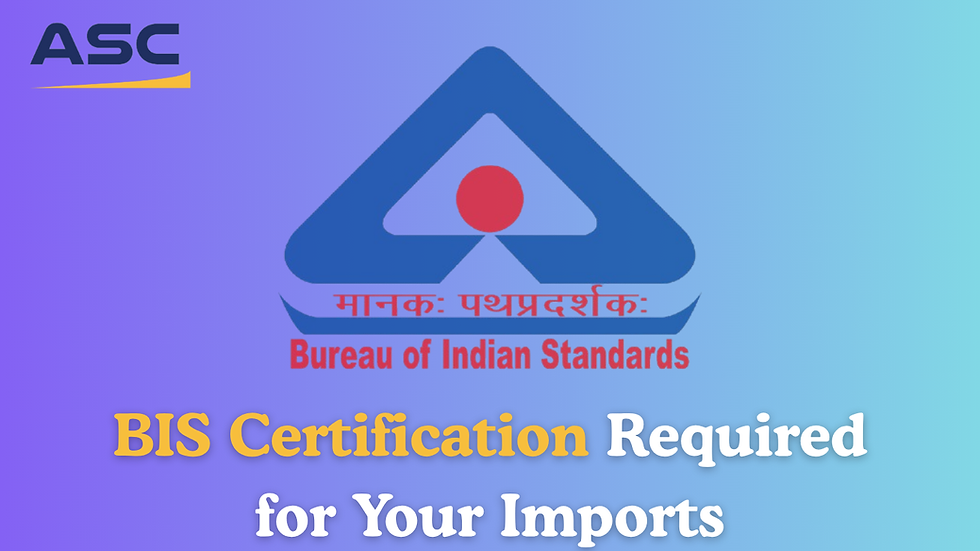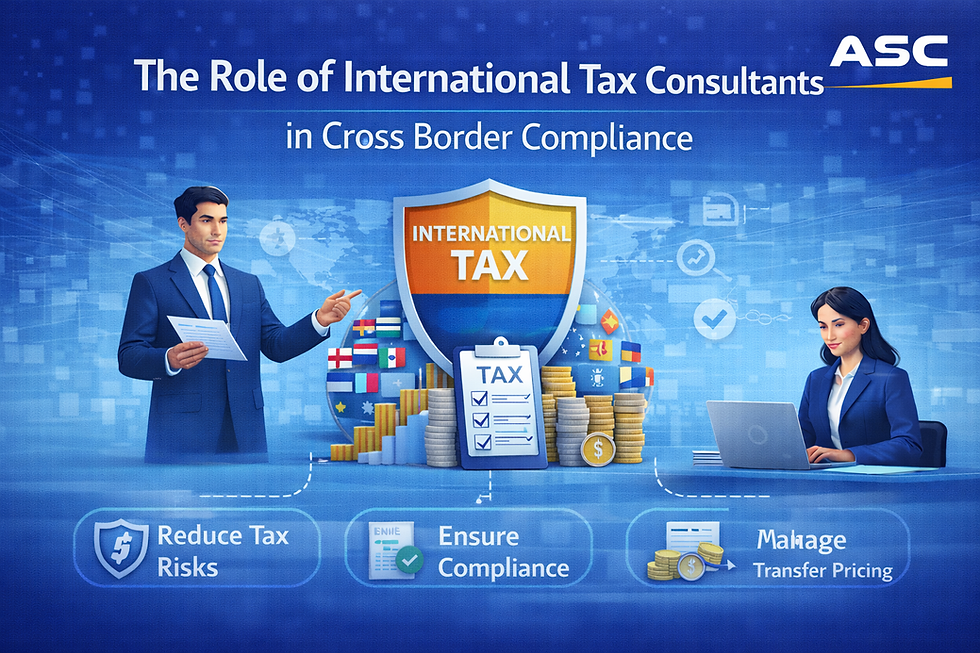Is BIS Certification Required for Your Imports?
- ASC Group
- Nov 5, 2025
- 4 min read
India’s import market is one of the most dynamic and rapidly growing in the world. With this expansion, the need for product quality, safety, and standardization has become more important than ever. To ensure that imported products meet these standards, the Bureau of Indian Standards (BIS) mandates certification for several categories of goods.
If you are an importer or a foreign manufacturer planning to sell products in India, understanding whether BIS Certification is required for your imports is crucial. In this blog, we’ll explore what BIS Certification means, when it is mandatory, and how ASC Group, one of India’s leading BIS Certification Consultants, can help you navigate the process seamlessly.
What is BIS Certification and BIS Registration?
BIS Certification is a conformity assessment process introduced by the Bureau of Indian Standards (BIS) to ensure that products meet Indian safety, quality, and performance benchmarks. It acts as a quality assurance mark that builds consumer confidence and ensures compliance with Indian regulations.
For importers and foreign manufacturers, this process usually involves BIS Registration, which refers to officially registering your product or brand under one of the BIS schemes — such as the Compulsory Registration Scheme (CRS) or the Foreign Manufacturer Certification Scheme (FMCS).
BIS Certification: Verifies product quality and compliance.
BIS Registration: Registers your product under BIS-approved standards and allows it to be imported and sold legally in India.
When is BIS Certification Required for Imports?
Not every imported product requires BIS Certification, but several categories do — particularly those that impact consumer safety or industrial quality.
✅ Products That Require Mandatory BIS Certification
If your products fall under BIS’s list of regulated items, certification becomes compulsory. This list includes:
Electrical and electronic items such as batteries, cables, LED lights, and switches.
Industrial materials like steel, cement, and chemicals.
Consumer goods such as kitchen appliances, toys, and pressure cookers.
In these cases, importers must obtain a valid BIS Certificate before customs clearance or sale in the Indian market.
❌ When BIS Certification Is Not Mandatory
If your imported product category is not part of BIS’s mandatory list, you can still choose to get voluntary certification. This enhances product credibility, improves market acceptance, and builds consumer trust — especially for brands new to India.
Consequences of Importing Without BIS Certification
Ignoring BIS Certification when it is mandatory can lead to significant setbacks:
🚫 Customs Rejection: Shipments may be held, delayed, or denied entry into India.
⚖️ Legal Penalties: Importers and distributors may face fines or legal action.
🕒 Business Delays: Non-compliance can disrupt supply chains and affect deadlines.
📉 Loss of Credibility: Retailers and consumers prefer certified, compliant products.
In short, skipping BIS Certification is not worth the risk — compliance ensures smooth operations, brand reputation, and consumer trust.
How to Get BIS Certification for Imports
The BIS Certification process involves several technical steps, but with proper guidance, it can be managed efficiently. Here’s a simplified overview:
Determine Applicability: Identify whether your product category requires BIS Certification.
Select the Correct Scheme: Choose between CRS, FMCS, or Scheme X, depending on product type and origin.
Prepare Documentation: Compile all required documents, including technical specifications, product test reports, and manufacturer details.
Product Testing: Send product samples to a BIS-recognized laboratory for testing and compliance verification.
Application Filing: Submit your BIS Certification or Registration application with all supporting details.
Inspection (if applicable): For some categories, BIS officials conduct factory or product audits.
Certificate Issuance: Once approved, BIS grants certification, allowing you to use the BIS standard mark on your products.
Renewal and Maintenance: Keep your certification active through timely renewals and periodic compliance checks.
How ASC Group Simplifies BIS Certification for Imports
Navigating BIS Certification can be challenging, especially for importers managing multiple product lines or foreign manufacturers unfamiliar with Indian standards. This is where ASC Group steps in as your trusted compliance partner.
Why Choose ASC Group?
End-to-End Assistance: From identifying product categories to securing final BIS Registration, ASC manages every step.
Industry Expertise: Experience across sectors like steel, electronics, consumer goods, and industrial products.
Testing Coordination: Smooth handling of product sample testing in BIS-recognized labs.
Liaison with BIS Authorities: Efficient communication and follow-ups with BIS departments for timely certification.
Ongoing Compliance Support: Guidance for renewals, audits, and regulatory updates.
ASC Group’s team of seasoned BIS Consultants ensures that your certification process is fast, accurate, and fully compliant — saving you both time and resources.
Practical Tips for Importers and Manufacturers
Here are a few essential tips for businesses planning to import products into India:
✔️ Check BIS Lists Regularly: Stay updated with the latest BIS notifications.
✔️ Start Early: Begin your certification process before shipment to avoid customs delays.
✔️ Maintain Documentation: Keep product reports and factory details up-to-date.
✔️ Plan for Renewals: BIS Certificates have validity periods; plan renewals in advance.
✔️ Work with Experts: A BIS Certification Consultant like ASC Group can simplify your journey and minimize errors.
Conclusion
So, is BIS Certification required for your imports?In most cases — yes, if your product falls under the regulated category. Compliance is not just about fulfilling a legal requirement; it’s about building trust, ensuring quality, and strengthening your brand’s market reputation in India.
With professional guidance from ASC Group, you can navigate the entire BIS Certification and Registration process confidently. Their expert team ensures smooth documentation, accurate testing coordination, and complete regulatory compliance for hassle-free market access.
Ready to Begin Your BIS Certification Journey?
Get expert assistance today.📞 Contact ASC Group for complete BIS Certification and Registration Consulting Services — helping importers and manufacturers achieve compliance with confidence.
🌐 For more info: ascgroup.in Original Source




Comments